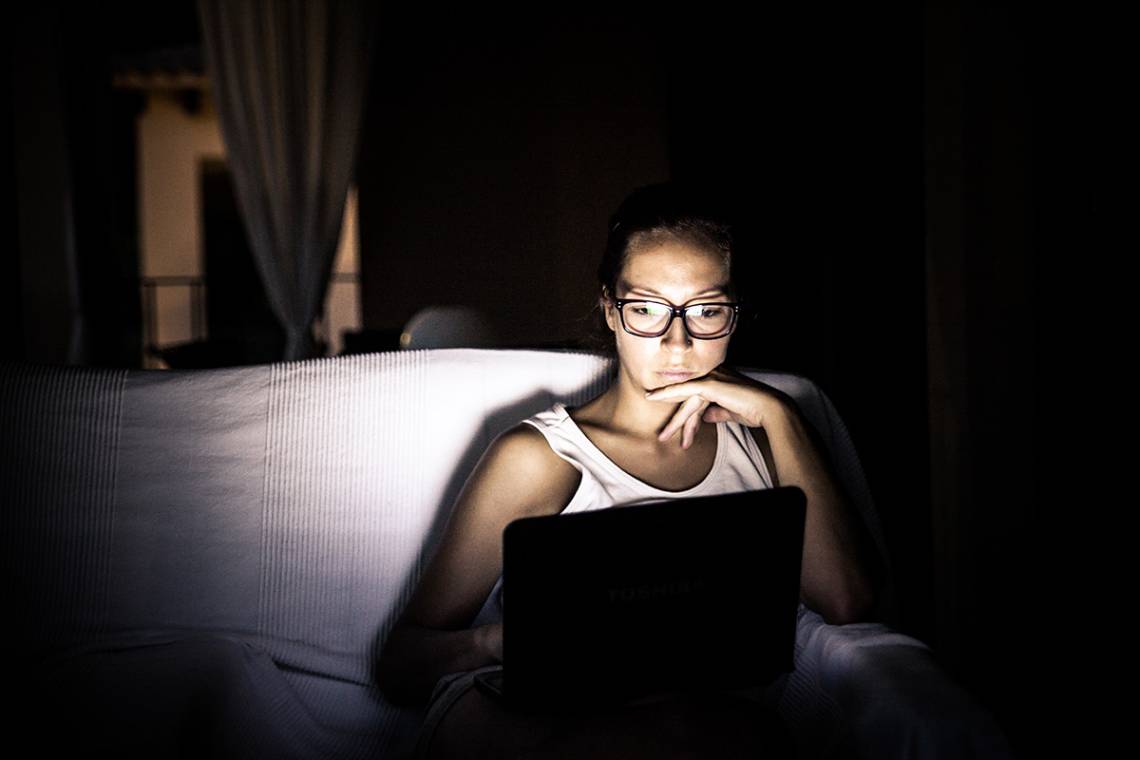People Far From Urban Lights, Bright Screens Still Skimp on Sleep
Rural farmers in Madagascar make up for lost slumber with a more regular sleep routine

DURHAM, N.C. -- Screen time before bed can mess with your sleep. But people without TV and laptops skimp on sleep too, researchers say. A Duke University study of people living without electricity or artificial light in a remote farming village in Madagascar finds they get shorter, poorer sleep than people in the U.S. or Europe.
But they seem to make up for lost shuteye with a more regular sleep routine, the researchers report in the American Journal of Human Biology.
Americans sleep less than they did a generation ago. The decline is largely attributed to artificial light before bedtime wreaking havoc on our ability to stay in sync with the 24-hour day.
Our bodies are particularly sensitive to the short-wavelength “blue” light emitted from smartphones, TVs, computers, LED bulbs and other devices. Staring at bright bluish light before bed sends a signal to the brain to secrete less melatonin, the hormone that makes you sleepy.
“I think we can safely assume that our ancestors weren’t staying up late at night cruising Facebook or looking at their e-readers,” said David Samson, a senior research scientist in evolutionary anthropology at Duke. "It makes falling asleep much harder.”
To better understand our natural sleep patterns, Samson, Duke professor Charles Nunn and colleagues went to the remote village of Mandena, in northeastern Madagascar, where most households do without electricity.
A farming community where people grow rice and cash crops such as vanilla, this tiny town at the outskirts of Marojejy National Park is one of the few remaining places on Earth where light pollution is not a problem.
The villagers of Mandena are among more than a billion people worldwide who live without artificial light. Instead of switching on a light when the sun goes down, most people in Mandena spend their evenings in relative darkness. Nights are lit by the glow of cooking fires and kerosene lamps, or, when it’s clear, the natural light of the moon and the stars.
The Duke researchers analyzed sleep-wake patterns in 21 people aged 19 to 59 while they slept at night and napped during the day.
The participants wore watch-like devices with built-in light and motion sensors that tracked subtle changes in their body movements and light exposure from one minute to the next, for 292 total nights of data.
Nine of these people also took a sleep test called a polysomnogram to determine how deep and restful their sleep was. The test uses sticky electrodes on the skin’s surface to measure and record electrical activity in the brain and muscles.
The data revealed that even without artificial lighting to disrupt their rest, people in Mandena get less sleep than most adults in the U.S. and Europe.
The villagers usually turned in around 7:30 p.m., two hours after sunset, and woke up around 5:30 a.m., about an hour before sunrise. But only 6.5 of those hours were spent sleeping -- 30 minutes to an hour less each night than people in the U.S. or Italy.
What sleep they did get was fragmented and light. Mandena villagers sleep together in houses with bamboo walls and tin or thatched roofs that do little to buffer noise. “On a nightly basis there are parties, dogs, roosters, children crying. It is a challenging environment for getting a good sleep,” said Nunn, director of the Triangle Center for Evolutionary Medicine and professor of evolutionary anthropology and global health at Duke.
The participants frequently woke up in the middle of the night, sometimes to use the bathroom, and then stayed up for an hour or two before returning to sleep. They also spent less time in deep sleep and the dream state known as REM sleep compared with Western populations.
Yet rather than complain about being bleary-eyed or foggy-brained, 60 percent reported they were happy with their sleep.
People in Mandena compensate for lost nighttime sleep by napping during the day, often for up to an hour. That’s nearly twice as long as the average catnap for Westerners, Samson said.
More importantly, Samson said, their sleep patterns were more consistent than most Westerners from one day to the next. Even when the researchers gave 10 people an LED camping lantern for a week, they still slept and woke at virtually the same times each day.
"Sticking to a schedule may be just as important as getting a solid night’s sleep,” Samson said.
The findings support other studies suggesting that humans were shortchanging their sleep even before the advent of electronic gadgets.
Diaries, court records and other historical documents suggest the ideal of getting seven to nine hours of uninterrupted sleep didn’t come about until recently. In preindustrial times broken sleep was the norm, according to research by sleep historian Roger Ekirch of Virginia Tech.
Samson plans to continue studying sleep patterns in traditional societies across the globe. “My ultimate goal is to build a global data set of traditional sleep,” he said.
This research was supported by Duke University’s Bass Connections program and the Duke Global Health Institute. Other authors of this study include Melissa Manus and James Yu of Duke, Andrew Krystal of the University of California, San Francisco, and Efe Fakir of the Bahçeşehir University School of Medicine.
CITATION: "Segmented Sleep in a Non-Electric, Small-Scale Agricultural Society in Madagascar," David Samson, Melissa Manus, Andrew Krystal, Efe Fakir, James Yu and Charles Nunn. American Journal of Human Biology, Feb. 9, 2017. DOI: 10.1002/ajhb.22979